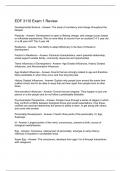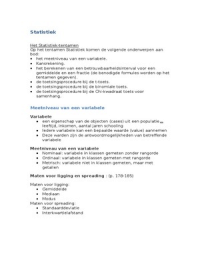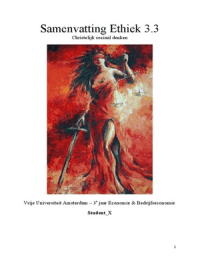WEEK THREE GRADE 2
ACTIVITY 1: GRADE 2 MANAGEMENT IN FOUNDATION PHASE CLASSROOM ACTIVITY
(MFP2601)
Read the following scenario and then answer the questions below:
There are two Grade 2 classes with 78 learners each. You have been allocated to teach them Home Language,
First Additional Language, Mathematics and Life Skills – a total of 50 periods per week. The written work policy
for the school stipulates that you must give those learners a minimum of four exercises per week for Home
Language, five for Mathematics, three for First Additional Language and two for Life Skills. You are also
expected to shoulder classroom administrative responsibilities. All learners must have report cards for their
academic performance at the end of each quarter.
1.1 Use the space provided and identify the challenges that you may encounter in managing large classes.
It is difficult to get a satisfactory knowledge of learners’ needs.
Intimacy with learners and remembering names might be a problem.
The noise level is inevitably high which adds to the stress a teacher may experience.
Organizing, planning and presenting lessons may constitute another challenge as learners abilities
might differ.
Engaging learners actively in the learning process may not be easy in a crowded class.
1.2 Suggest ways in which you can manage those challenges so that you can meet the expectations of the
school.
Train learners to work in small groups of five or seven and their sitting should be in a circle so that
everyone could have a chance to participate.
Split the class into weak learners and more able learners as it would make it possible for the teacher
to concentrate on the weaker learners.
Establish simple rules of acceptable behavior for everybody to observe when working in groups, in
pairs or individually in order to reduce stress and noise.
To optimize work with learners with learning difficulties, the teacher should give them seats in front,
closer to so that you can spot difficulties easily while teaching.
Pair weaker learners with stronger ones and find active roles for learners to avoid them being lazy.
ACTIVITY 2: GRADE 2 FACE-TO-FACE HOME LANGUAGE LESSON (HLT3701)
There are five comprehension strategies that Pressley (2006) feels young readers need to know. These are
prediction, questioning, visualizing, seeking clarification and summarizing.
Plan a lesson where you will be teaching shared reading in a Grade 2 class. Choose at least three
comprehension strategies you will be developing for learners during the lesson. Note the following:
(i) Specify in your lesson presentation how you will develop each strategy. Remember to attach the
story that you have taught to your workbook.
,LESSON: GRADE 2 HOME LANGUAGE – SHARED READING
Name & student number Ncobile Shongwa Grade & date 2
Content area Shared reading Subject Home language
Type of lesson Class lesson/ Group Theme of the week Let’s read
work/Outdoor/Fieldwork
Name of school Name of teacher
Outcomes Learners are able to:
Read and comprehend a text at their independent reading level.
Concepts and new fiction
knowledge of the lesson retell
reading stamina
Differentiation provided Enrichment: Allow learners to illustrate their favorite part of the story in
(Enrichment/learner their reading log or journal. Encourage the learners to write a few
support/concerns) sentences on why this was their favorite part of the story.
Support: Allow learners to read their text aloud to a teacher or partner.
Guide learners as they fill out the Reading Stamina Chart and Paragraph
Frame Worksheet for Fictional Text Retell.
LESSON PRESENTATION
Introduction of Pin the Reading Stamina Chart on the board.
lesson Point the words reading stamina and ask the learners if they know what
reading stamina means. Explain that, “Reading stamina means being able to
stick with something for long periods of time. This stamina, or endurance,
builds strength. Stamina can also be used when playing a sport or creating an
art project. We can build our reading stamina by choosing 'just right books,' or
books that we can read independently, without really struggling to read the
words, for at least 15–20 minutes!”
Pin the Finding Just-Right Books worksheet on the board and briefly explain
how to use the five finger rule to figure out if a book is at their independent
reading level.
Explain to learners that today they will be working on their reading stamina as
they read a “just right” fictional text independently.
Write and read the following learning objectives in learner-friendly terms and
have the learners choral chant the learning objectives back to me:
o I can increase my reading stamina by reading a "just right" book
independently.
o I can retell a story after reading a "just right" fictional text.
Practice finding “just right” fictional texts with learners prior to the lesson. And
define reading stamina in English and learner's home language.
Body of lesson Choose a short fictional text that learners are very familiar with. Briefly discuss
, that a fictional text or book is a story that is imaginary, or pretend.
Show learners the cover and explain that I’m going to pretend that I have just
read the book independently for 20 minutes.
Keep the Reading Stamina Chart pinned on the board and explicitly model how
to fill in the date and shade in the bar graph up to the number 20.
Pin the Paragraph Frame Worksheet for Fictional Text Retell on the board.
Read through the paragraph frame aloud and model filling it out, searching in
the fictional text for answers. Allow learners to help fill out the chart when
appropriate.
Ask a learner to read the completed paragraph aloud when we are finished.
Say, “Increasing our reading stamina can make us better readers! We can also
become better readers by retelling the stories that we read!”
Pass out copies of the Reading Stamina Chart to learners and tell them to glue
the chart in their reading log or journal.
Next, pass out a copy of the Paragraph Frame Worksheet for Fictional Text
Retell. Guide them to glue the worksheet in their reading logs or journals, too.
Provide copies of the Finding Just-Right Books worksheet for learners to use as
a tool to figure out if a book is at their independent reading level.
Give learners a few minutes to choose a short fictional text at their reading
level from the classroom library. Emphasize that during independent reading
time, they should have eyes looking at their story, read to understand, and
have quiet mouths and quiet hands.
Consolidation Provide learners with the following questions and instruct them to share their
/Conclusion answers with a partner:
o How does increasing your reading stamina and retelling a story make
you a better reader?
o Can you retell the story you read using the words beginning, middle,
and end?
ASSESSMENT
1) Assessor Did the student involve the learners by asking a learner/s to Self-assessment
repeat a sentence, word or action? Yes Peer assessment
Teacher assessment
Pair learners to do or complete an action or activity. Yes
Was there evidence of inclusion? Yes
2) Type of Participation – answering questions, reading activities, dialogue, role play
activity Written work (writing exercises, essays, making models, drawings, painting)
Demonstrations (physical demonstrations, performing actions, experiments)
Models (collages, artwork, constructions)
3) Strategy or Questioning Writing Reading Reviewing
Methods Listening Observation Interpreting Watching video
Listening
comprehension
4) Assessment Checklist Analytical rubric Other: give detail
instrument Assessment scale Holistic rubric
, REFLECTION
The lesson was successful and all learning outcomes were achieved.
RESOURCES Class set of the Reading Stamina Chart worksheet
Class set of the Paragraph Frame Worksheet for Fictional Text Retell
Class set of the Finding Just-Right Books worksheet
A variety of grade level fictional texts Familiar fictional text or book
Reading logs or journals
Glue or tape
TEACHER/MENTOR EVALUATION – HOME LANGUAGE
How did you assist the student with the planning?
When did the student provide the completed lesson plan to you? (before or after the lesson)
Planning Question to be answered Not yet Almost Achieved Excellent
achieved achieved
1 2 3 4
Outcomes Were the outcomes achieved? yes
Concepts and new Were concepts and new knowledge
knowledge of the explained? yes
lesson
Differentiation Were the types of questions posed to
provided learners sufficient, directed to the content
(Enrichment/ and adequate? yes
learner
support/concerns)
LESSON PRESENTATION Not yet Almost Achieved Excellent
achieved achieved
1 2 3 4
Was the introduction relevant? Yes
Introduction of lesson
Was the introduction interesting and did it capture
the learners’ attention? Yes
Was prior knowledge included? Yes
Was it an interesting introduction? Yes
ACTIVITY 1: GRADE 2 MANAGEMENT IN FOUNDATION PHASE CLASSROOM ACTIVITY
(MFP2601)
Read the following scenario and then answer the questions below:
There are two Grade 2 classes with 78 learners each. You have been allocated to teach them Home Language,
First Additional Language, Mathematics and Life Skills – a total of 50 periods per week. The written work policy
for the school stipulates that you must give those learners a minimum of four exercises per week for Home
Language, five for Mathematics, three for First Additional Language and two for Life Skills. You are also
expected to shoulder classroom administrative responsibilities. All learners must have report cards for their
academic performance at the end of each quarter.
1.1 Use the space provided and identify the challenges that you may encounter in managing large classes.
It is difficult to get a satisfactory knowledge of learners’ needs.
Intimacy with learners and remembering names might be a problem.
The noise level is inevitably high which adds to the stress a teacher may experience.
Organizing, planning and presenting lessons may constitute another challenge as learners abilities
might differ.
Engaging learners actively in the learning process may not be easy in a crowded class.
1.2 Suggest ways in which you can manage those challenges so that you can meet the expectations of the
school.
Train learners to work in small groups of five or seven and their sitting should be in a circle so that
everyone could have a chance to participate.
Split the class into weak learners and more able learners as it would make it possible for the teacher
to concentrate on the weaker learners.
Establish simple rules of acceptable behavior for everybody to observe when working in groups, in
pairs or individually in order to reduce stress and noise.
To optimize work with learners with learning difficulties, the teacher should give them seats in front,
closer to so that you can spot difficulties easily while teaching.
Pair weaker learners with stronger ones and find active roles for learners to avoid them being lazy.
ACTIVITY 2: GRADE 2 FACE-TO-FACE HOME LANGUAGE LESSON (HLT3701)
There are five comprehension strategies that Pressley (2006) feels young readers need to know. These are
prediction, questioning, visualizing, seeking clarification and summarizing.
Plan a lesson where you will be teaching shared reading in a Grade 2 class. Choose at least three
comprehension strategies you will be developing for learners during the lesson. Note the following:
(i) Specify in your lesson presentation how you will develop each strategy. Remember to attach the
story that you have taught to your workbook.
,LESSON: GRADE 2 HOME LANGUAGE – SHARED READING
Name & student number Ncobile Shongwa Grade & date 2
Content area Shared reading Subject Home language
Type of lesson Class lesson/ Group Theme of the week Let’s read
work/Outdoor/Fieldwork
Name of school Name of teacher
Outcomes Learners are able to:
Read and comprehend a text at their independent reading level.
Concepts and new fiction
knowledge of the lesson retell
reading stamina
Differentiation provided Enrichment: Allow learners to illustrate their favorite part of the story in
(Enrichment/learner their reading log or journal. Encourage the learners to write a few
support/concerns) sentences on why this was their favorite part of the story.
Support: Allow learners to read their text aloud to a teacher or partner.
Guide learners as they fill out the Reading Stamina Chart and Paragraph
Frame Worksheet for Fictional Text Retell.
LESSON PRESENTATION
Introduction of Pin the Reading Stamina Chart on the board.
lesson Point the words reading stamina and ask the learners if they know what
reading stamina means. Explain that, “Reading stamina means being able to
stick with something for long periods of time. This stamina, or endurance,
builds strength. Stamina can also be used when playing a sport or creating an
art project. We can build our reading stamina by choosing 'just right books,' or
books that we can read independently, without really struggling to read the
words, for at least 15–20 minutes!”
Pin the Finding Just-Right Books worksheet on the board and briefly explain
how to use the five finger rule to figure out if a book is at their independent
reading level.
Explain to learners that today they will be working on their reading stamina as
they read a “just right” fictional text independently.
Write and read the following learning objectives in learner-friendly terms and
have the learners choral chant the learning objectives back to me:
o I can increase my reading stamina by reading a "just right" book
independently.
o I can retell a story after reading a "just right" fictional text.
Practice finding “just right” fictional texts with learners prior to the lesson. And
define reading stamina in English and learner's home language.
Body of lesson Choose a short fictional text that learners are very familiar with. Briefly discuss
, that a fictional text or book is a story that is imaginary, or pretend.
Show learners the cover and explain that I’m going to pretend that I have just
read the book independently for 20 minutes.
Keep the Reading Stamina Chart pinned on the board and explicitly model how
to fill in the date and shade in the bar graph up to the number 20.
Pin the Paragraph Frame Worksheet for Fictional Text Retell on the board.
Read through the paragraph frame aloud and model filling it out, searching in
the fictional text for answers. Allow learners to help fill out the chart when
appropriate.
Ask a learner to read the completed paragraph aloud when we are finished.
Say, “Increasing our reading stamina can make us better readers! We can also
become better readers by retelling the stories that we read!”
Pass out copies of the Reading Stamina Chart to learners and tell them to glue
the chart in their reading log or journal.
Next, pass out a copy of the Paragraph Frame Worksheet for Fictional Text
Retell. Guide them to glue the worksheet in their reading logs or journals, too.
Provide copies of the Finding Just-Right Books worksheet for learners to use as
a tool to figure out if a book is at their independent reading level.
Give learners a few minutes to choose a short fictional text at their reading
level from the classroom library. Emphasize that during independent reading
time, they should have eyes looking at their story, read to understand, and
have quiet mouths and quiet hands.
Consolidation Provide learners with the following questions and instruct them to share their
/Conclusion answers with a partner:
o How does increasing your reading stamina and retelling a story make
you a better reader?
o Can you retell the story you read using the words beginning, middle,
and end?
ASSESSMENT
1) Assessor Did the student involve the learners by asking a learner/s to Self-assessment
repeat a sentence, word or action? Yes Peer assessment
Teacher assessment
Pair learners to do or complete an action or activity. Yes
Was there evidence of inclusion? Yes
2) Type of Participation – answering questions, reading activities, dialogue, role play
activity Written work (writing exercises, essays, making models, drawings, painting)
Demonstrations (physical demonstrations, performing actions, experiments)
Models (collages, artwork, constructions)
3) Strategy or Questioning Writing Reading Reviewing
Methods Listening Observation Interpreting Watching video
Listening
comprehension
4) Assessment Checklist Analytical rubric Other: give detail
instrument Assessment scale Holistic rubric
, REFLECTION
The lesson was successful and all learning outcomes were achieved.
RESOURCES Class set of the Reading Stamina Chart worksheet
Class set of the Paragraph Frame Worksheet for Fictional Text Retell
Class set of the Finding Just-Right Books worksheet
A variety of grade level fictional texts Familiar fictional text or book
Reading logs or journals
Glue or tape
TEACHER/MENTOR EVALUATION – HOME LANGUAGE
How did you assist the student with the planning?
When did the student provide the completed lesson plan to you? (before or after the lesson)
Planning Question to be answered Not yet Almost Achieved Excellent
achieved achieved
1 2 3 4
Outcomes Were the outcomes achieved? yes
Concepts and new Were concepts and new knowledge
knowledge of the explained? yes
lesson
Differentiation Were the types of questions posed to
provided learners sufficient, directed to the content
(Enrichment/ and adequate? yes
learner
support/concerns)
LESSON PRESENTATION Not yet Almost Achieved Excellent
achieved achieved
1 2 3 4
Was the introduction relevant? Yes
Introduction of lesson
Was the introduction interesting and did it capture
the learners’ attention? Yes
Was prior knowledge included? Yes
Was it an interesting introduction? Yes






